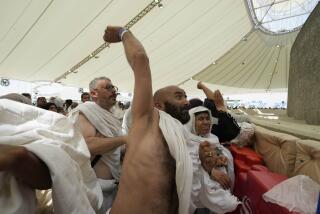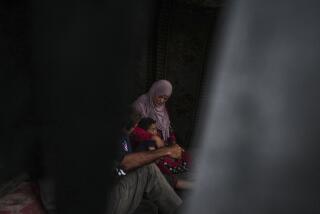Muslims Try to Preserve Ramadan
- Share via
The holiday season is always a bit of a struggle for Muslim parents like Saida Pernas. Last December, her 6-year-old son brought home plates decorated at school with Christmas trees and a Hanukkah menorah--but nothing to symbolize his own traditional holiday of Ramadan.
“I asked him, ‘What’s this?’ ” Pernas said. “It’s impossible to convince him of our traditions. He thinks it’s all one holiday. In school, they teach about many different holidays, but I wish there were more of Islam in it.”
For Muslims, the holy month of Ramadan, which began when the new moon was sighted Saturday night, is a time to focus on repentance and spirituality. Muslims mark the religious observance by fasting from sunrise to sunset.
But with Ramadan uncharacteristically falling in late December this year, parents are fielding a barrage of questions from their school-age children, who invariably compare Ramadan with the more pervasive public imagery of the Christian and Jewish holidays.
“It’s hard to compete with the glamorous celebrations of Christmas and Hanukkah,” said Hussam Ayloush, executive director of the Council on American-Islamic Relations.
“Kids tend to ask, ‘Why don’t we have a Christmas tree? Why don’t we have Santa come to the mosque?’ These are valid questions for kids. Even my kids ask me that. But I say, ‘We have our own traditions to celebrate.’ ”
Local Muslim groups have been working with a number of schools to increase awareness about Ramadan, but it remains a fairly slow process. For the most part, school districts have a policy of careful neutrality with regard to December observances. Administrators and teachers offer “Happy Holidays” greetings, but leave it nonspecific. Discussions about Ramadan come up only at the teacher’s discretion.
But some schools are attempting a more proactive approach. The Garden Grove Unified School District, which has a significant Muslim population, invited the Fountain Valley-based Council on Islamic Education to do a presentation at a teachers workshop on multiculturalism in March, said Donna Sievers, a district instructional specialist.
Still, it is not uncommon to find classrooms throughout the region where students sing Christmas carols and participate in “secret Santa” gift exchanges. For some Muslims, that can be a little problematic, Ayloush said.
Some parents find themselves trying to make Ramadan more festive, he said. For example, the end of the holy month is marked by a celebration called Eid ul-Fitr. Typically, children receive gifts of money, but parents have begun giving presents instead.
Other Muslims believe it is offensive to link Jesus, whom they consider a holy prophet, to the ancient pagan rituals of Christmas.
Shabbir Mansuri, director of the Council on Islamic Education, says he encourages parents to deal with concerns by volunteering to come into schools and do short presentations to classes on the customs and history of Ramadan.
“I find that teachers are usually more than happy to invite the parents to class,” he said.
It is something that Pernas, of Santa Ana, has been doing for a couple of years in her five children’s schools.
“Last year, I gave a talk to the children in my son’s class about Islam and the prophets, and they were very struck by that. I had parents tell me their children had told them about the stories,” she said. “It’s hard not being in your country and trying to explain about your religion, but we do the best we can.”
(BEGIN TEXT OF INFOBOX / INFOGRAPHIC)
The Month of Ramadan
Ramadan is the holy Islamic month when Muslims abstain from food, drink and sensual pleasures from dawn to sunset each day. The fasting is performed to learn discipline, self-restraint and generosity while obeying God’s commandments. Fasting (along with the declaration of faith, daily prayers, charity and the pilgrimage to Mecca) is one of the “five pillars” of Islam. Because Ramadan is a lunar month, it shifts by 11 days according to the solar calendar every year.
Who must fast?
Those past the age of puberty who are mentally and physically fit.
Exemptions from fasting
* Pregnant women, nursing mothers and women who are menstruating
* Sick people
* Old people
* Travelers on journeys more than 50 miles
Traditional practices
* Breaking the fast with dates and a drink of water
* Reading the entire Koran during Ramadan
* Visiting with friends
Special events
* Special prayers, called taraweeh, are performed after the nighttime prayers.
* Lailat ul-Qadr (Night of Power) marks the anniversary of when the prophet Muhammad began receiving revelations from God through the angel Gabriel. It is one of the last odd-numbered nights of Ramadan.
* Eid ul-Fitr celebration marks the end of Ramadan.
Source: Council on American-Islamic Relations
More to Read
Sign up for Essential California
The most important California stories and recommendations in your inbox every morning.
You may occasionally receive promotional content from the Los Angeles Times.










